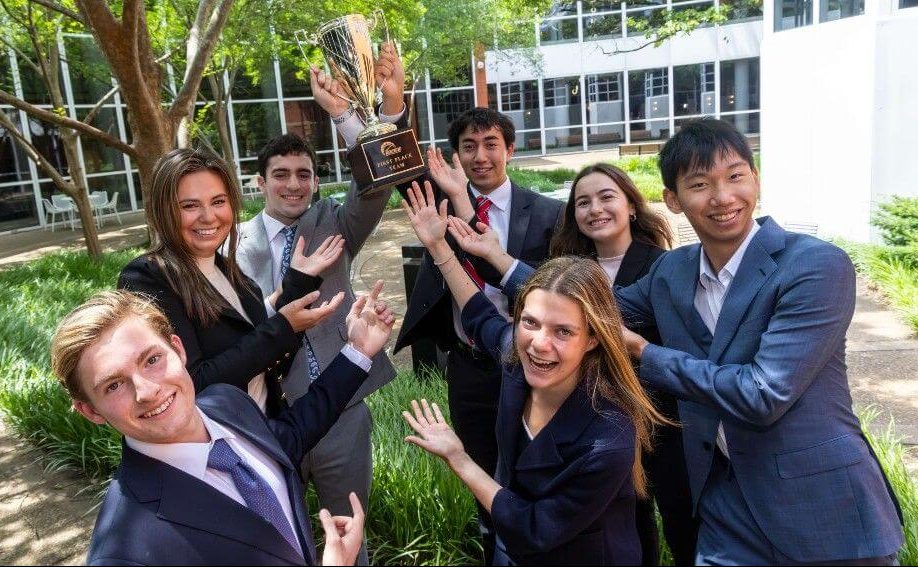By Will Wieters
In the opening week of Vanderbilt’s Accelerator® Summer Business Immersion, students stepped into the shoes of consultants, tasked with reimagining how Asurion—an industry leader in tech care and protection—could better reach an emerging consumer demographic: Gen Z.
For many of the undergraduate students in the room, the case presented an all too familiar relationship with technology. Particularly for Gen Z, it is constant, essential and often fraught with frustration. Yet despite that reliance, many students had never heard of Asurion or its device repair arm, uBreakiFix. That awareness gap quickly became the starting point for nearly a dozen strategy proposals designed to integrate Asurion more deeply into the lives and campuses of young consumers.
A Real-World Challenge with a Local Partner
Asurion, headquartered in downtown Nashville, brought a complex and timely question to the table: How can a legacy tech protection company build brand affinity and long-term loyalty with a tech-savvy generation?
Student teams were encouraged to approach the case from a strategic consulting lens, developing market-ready solutions that balanced innovation with feasibility. Common themes across the eight proposals included AI integration, on-campus accessibility, and subscription-based pricing models. These concepts were informed by a mix of original survey data, interviews, and market research gathered by each group.
The Solutions: AI Tools, Campus Hubs, and Embedded Insurance
Across the eight student teams, several recurring themes emerged:

Congrats to Group H (Graham Akin, Now Bremen, Sarah Hinely, Shuhai Zhang, Drew Collis, Ayla Richards, Tyler Khanolkar) on winning the first week’s challenge!
- AI as a differentiator: From intelligent troubleshooting to real-time diagnostics and agentic memory, nearly every team explored how Asurion could lead with AI—meeting Gen Z’s expectation for fast, intuitive service.
- On-campus presence: Several teams proposed university-based pilots, including self-service kiosks and student tech hubs that could provide convenient, 24/7 support outside of traditional IT departments—an all-too-common source of tech frustration for students.
- Bundled protection: Whether folded into tuition, tied to renters’ insurance, or marketed as a digital academic toolkit, teams looked for ways to simplify access to device protection through pre-existing student expenses.
Top Performers: Creative Vision Meets Business Rigor
After a highly competitive round, Team H took first place with their “Asurion Scholar Bundle” concept. The proposal outlined a university-licensed platform that combines device protection with academic AI tools, integrated directly into campus learning systems like Canvas and Blackboard. Judges praised the team’s foresight in pairing Asurion’s technical capabilities with the education sector’s software ecosystem.
Team B was recognized with the Walker Management Library’s Research Award for their “AsurionRental+” idea—a renters’ insurance and tech protection bundle targeting Gen Z consumers at pivotal life transitions. The team’s use of AI for customer profiling and long-term upsell potential stood out, as did their thoughtful financial modeling.
In addition, Team C received runner-up research recognition for their uBreakiFix kiosk proposal. Their model introduced self-service repair stations on college campuses, supported by an AI chatbot and optional in-person assistance. Survey data and behavioral research helped ground their pitch in current student preferences.
Learning Through Doing: The Accelerator Summer Business Immersion Experience
More than just a classroom case study, this first partnership was an opportunity to engage with a real-world business challenge and receive direct feedback from industry professionals. Asurion representatives questioned teams on everything from cost structures to post-graduate scalability, pushing students to clarify assumptions, justify decisions, and think critically about implementation.
As the summer business immersion program progresses, students will turn their focus to new partner companies and new industries. But for now, the first round of presentations has already delivered on the Accelerator program’s core promise: providing meaningful, hands-on business experience with real-world stakes and professional accountability.